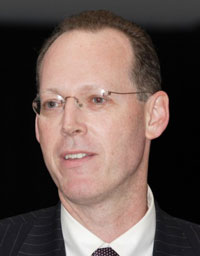Paul Farmer and the Human Right to Development
by William Easterly

I’ll write one final post to complete the human rights trilogy, then collapse from exhaustion and go back to easy topics like World Bank follies.
Paul Farmer is my hero as a man of action, who has done amazing things for poor people at great personal sacrifice. He is also a forceful advocate for the human rights of the poor to health care, to food, to housing, to literacy, and to jobs. (I will be quoting from his Tanner Lecture from 2005.)
In his words, “poor people deserve access to food, education, housing, and medical services.” He calls “for these basic rights to be extended to all those who need them.” Poverty is indeed tragic, which all of us care about, which all of us are working on.
But who will be held responsible to satisfy these rights? Farmer struggles for an answer. With health care, for example: “we’ve learned that the public sector, however weak in these places, is often the sole guarantor of the right(his emphasis) of the poor to health care.”
Yes, the poor country government is weak and has a limited budget (as they would, even after aid). What if after satisfying the right to health care, there is nothing left to satisfy the right to food? Who decides between health and food? What if there is not enough even to treat all illnesses as completely as they deserve (as there is not enough even for most rich people)? Who decides which diseases get treated and which patients get treated? Farmer treats all of these as absolutes, so there is no way to choose in a human rights approach. We are left in the end only with the original problem – there is global poverty.
No single actor gets any guidance from human rights what step that actor could take to do the MOST good for the MOST poor people. Such concrete steps by specialized actors, both public and private, already worked to reduce mortality, to reduce malnutrition, to reduce illiteracy considerably over the last half century.
Farmer is deeply inspirational on the tragedy of world poverty, but his human rights approach is vague on who is to blame or where to go next:
only a social movement involving millions, most of us living far from these difficult settings, could allow us to change the course of history….troves of attention are required to reconfigure existing arrangements if we are to slow the steady movement of resources from poor to rich—transfers that have always been associated… with violence and epidemic disease… whether or not we can say “never again” with any conviction—will depend on our collective courage to examine and understand the roots of modern violence and the violation of a broad array of rights, including social and economic rights.
I will always venerate Paul Farmer as a hero in the fight against poverty.
Guidance how to fight poverty will have to come somewhere else than from economic and social human rights.
 From Aid to Equality
From Aid to Equality
